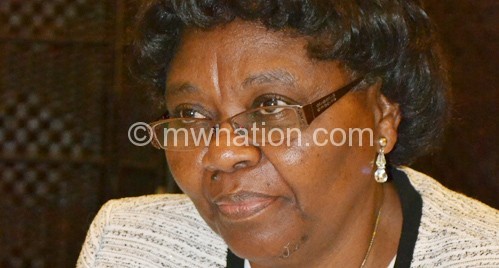‘Election rigging claims vindicated’
The High Court order for a rerun in Lilongwe City South East Constituency confirms the lack of credibility of the May 20 Tripartite Elections results after establishing that evidence submitted to the court was only ‘a tip of the iceberg’.
A legal scholar has since urged the Malawi Electoral Commission (MEC) to investigate elements of criminality surrounding the 2014 elections for possible prosecution.

But despite the ruling that should otherwise have opened a can of worms, presidential and parliamentary candidates who were unsatisfied with the results may have no chance of overturning the outcome in court because electoral laws only allow for court petitions within 48 hours, experts confirmed yesterday.
On Tuesday, the High Court in Lilongwe nullified the parliamentary election in which MEC declared Democratic Progressive Party (DPP) candidate Bently Namasasu winner by 98 votes against Malawi Congress Party (MCP) candidate Ulemu Msungama who has successfully challenged the result. The court has since ordered a rerun.
In her ruling, Justice Esme Chombo said it was difficult for her to decide who won the election in the constituency because of the unreliability of the documentary evidence as “most of them have “cancellations, writing over and wrong additions”—explaining that relying on the documents may result in “miscarriage of justice”.
Legal commentator based at South Africa’s University of Cape Town, Professor Danwood Chirwa, said in an e-mail interview yesterday that much as the decision had no legal implication for the parliamentary and presidential elections in general, “it was confirmation that irregularities in the constituency substantiated the claims of rigging in the May 20 polls”.
However, Chirwa said in the absence of petitions on presidential election results by the losing candidates, Malawi would be left to speculate if the irregularities were specific to Lilongwe City South East or they were endemic throughout the country.
Said Chirwa: “If they were rampant, the affected parties and contestants have done the country a great disservice in condoning electoral fraud. Their inaction means that we will never know the whole truth about the 2014 Parliamentary and Presidential Elections.
“In turn, this means that we may never be in a position to devise the appropriate mechanisms for preventing such fraudulent conduct in future.”

He implored MEC to investigate what happened in Lilongwe City South East and take appropriate “administrative and criminal action” where any crimes or electoral fraud were committed.
“One of the consequences of this decision, which you may not have envisaged, relates to what the Malawi Electoral Commission will do. It is not enough for it to arrange by-elections,” he said.
Justice Link executive director Justin Dzonzi concurred with Chirwa that much as challenges such as shortage of materials were encountered in the past election, “it cannot be ruled out that this could also be a result of incompetence and if that is the case then the responsible officers should be fired.”
Dzonzi, who described the 2014 elections results as “incredible”, also advised MEC to carry out quality control checks and recruit people competent in mathematics and sciences apart from teachers who work as polling officers.
In affidavits, which Justice Chombo quoted in her ruling, MEC—through its chairperson Justice Maxon Mbendera’s affidavit—conceded that the commission had noted the inconsistencies on Stream Four at Chilinde School Polling Centre, which gave Msungama 100 less votes than were tallied.
But Mbendera said MEC was not able to carry out proper investigations given the eight days that the law gives them within which to announce the results.
“That nevertheless, the respondent [MEC] considered that there appeared to be something wrong with the authenticity of the result sheet; it considered and encouraged the challenge of those results,” Mbendera’s affidavit reads.
MEC also conceded that 50 votes were left out in posting the final tally in the system.
The affidavits also indicate that it was MEC, through Mbendera, which suggested the alternative of a rerun after the recount failed due to a fire that destroyed the evidence from the constituency in a MEC warehouse.
In his affidavit, Msungama contested that a copy of his official result sheet and those for the People’s Party (PP) and United Democratic Front (UDF) candidates showed that he polled 131 votes on the stream.
Affidavits by presiding officers and MEC officials also indicated that on stream 1 at Chilinde School centre, it was recorded that 120 votes were cast for Namasasu and 85 for Msungama instead of the other way round.
However, Chombo has disregarded the evidence submitted with affidavits, saying it had only served to unveil further irregularities that the court could not deal with “because most of the documents had cancellations, written over and had wrong additions”.
“This may be an indication that what has surfaced may only be a tip of the iceberg,” Chombo said in supporting her order for a rerun in the constituency.
Commissioner Emmanuel Chinkwita-Phiri said, as MEC, they would abide by the court’s decision and hold a by-election in the constituency within the stipulated 90 days once a budget is submitted and approved by Treasury.
There were six candidates, among them two independents, who contested in Lilongwe City South East and the court has asked MEC to lay down procedures for candidates to follow in the rerun. n






All MEC commissioners should resign by 15 November, 2014. If Not, people will force them out of office. I am organising a mass demonstration countrywide. Almost 14 million people have confirmed to participate. From the Director Centre for Ubunthu